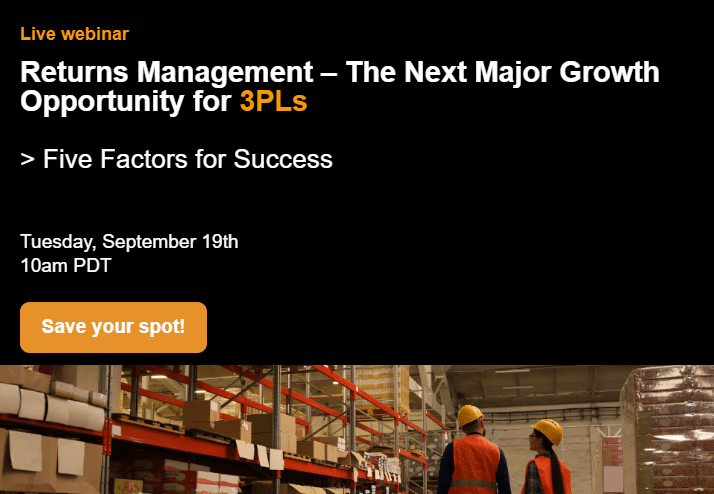As Steve Jobs once said, ‘Get closer than ever to your customers. So close that you tell them what they need before they realize it themselves.’ This sentiment encapsulates the essence of the collaboration we’re about to unravel.
In the dynamic realm of modern e-commerce, where convenience and expediency stand as imperatives, the intricacies of return management have risen to become a linchpin dictating customer loyalty and overall business prosperity.
As the CEO of ReverseLogix, I am not just an observer but a participant in this evolution. This discourse embarks on an exploration of the profound collaboration between third-party logistics (3PLs) and the e-commerce sphere. It unveils a transformation within the returns process, a metamorphosis propelled by this synergy, yielding a harmonious and customer-centric experience.
The Evolution of E-commerce Returns
In the ever-evolving land of e-commerce, a seismic shift has occurred, not only transforming the consumer shopping experience but also reshaping the very contours of their expectations, especially when it comes to returns. The winds of change have ushered in a new era, one where the conventional process of returns has been infused with dynamism and complexity. Consider this evolution:
- From Transaction to Relationship: E-commerce has transcended the mere transactional exchange, evolving into an intricate relationship between brands and their customers.
- Statistical Resonance: According to Statista, the year 2022 witnessed a staggering $817 billion worth of return deliveries in the United States, signifying the sheer scale and economic significance of this facet.
- Consumer Behavior’s Metamorphosis: The very essence of consumer behavior has undergone a paradigm shift, as the “buy now, think later” mentality dominates decision-making processes.
- Quest for Seamless Efficiency: In a landscape dominated by instant gratification, there is a resounding demand for a streamlined returns process that mirrors the shopping experience itself.
Yet, nestled within this transformation lies a silent force with the power to either fortify or erode brand loyalty: the return process. What was once an inconvenience has now morphed into a strategic touchpoint for customer service, wielding the potential to sway the tides of loyalty. A Harvard Business Review study underscores the transformational potential. It unveils a profound insight: customers who traverse the return journey with ease are not just one-time buyers but prospective stalwarts of repeat business.
As we embark on this exploration of the e-commerce cosmos, where returns have become the lodestar guiding brand-consumer relationships, it’s worth pondering the words of management guru Peter Drucker: “The purpose of a business is to create a customer who creates customers.”
In this era of returns reimagined, this adage assumes a heightened significance, encapsulating the delicate dance between brands and their patrons, where the returns experience weaves the threads of a lasting bond.
3PLs and E-commerce Returns: Simplifying the Complexity
In the digital marketplace, where every click initiates a transaction, returns pose a captivating conundrum. Imagine this: a customer orders a pair of shoes, receives them promptly, but upon arrival, finds they don’t quite fit the way they imagined. This scenario, played out countless times across the e-commerce landscape, highlights the intricate problem of managing returns. The issues do not end here.
Challenges of managing e-commerce returns:
- The high cost of returns: The cost of processing returns can be significant, including the cost of shipping, labor, and lost inventory.
- The environmental impact of reverse logistics: The transportation of returned goods can have a negative impact on the environment.
- The difficulty of preventing returns: It can be difficult to prevent returns, as there are many reasons why customers may return items, such as dissatisfaction with the product, sizing issues, or simply changing their mind.
In the world of modern business, e-commerce returns have become a crucial part. This shift has been greatly influenced by 3PLs. These experts have transformed the way returns work, making them smoother and more coordinated. Here’s how they do it:
- Making Things Efficient: 3PLs act like an extension of a brands business, making the returns process more efficient, while aligning with a brands service promise to their customers. They organize everything so it works together smoothly.
- Taking Away the Hassle: These experts handle all the tricky parts of the returns process, from receiving, inspecting, and grading returns, all the way to restocking so e-commerce companies can focus on what they do best.
- Customizing the Experience: 3PLs make solutions that fit perfectly with each e-commerce business. They adjust their services to make everything work just right.
By working with a 3PL, e-commerce businesses can simplify the complexity of returns and improve the overall customer experience. This can lead to increased sales, improved customer satisfaction, and a stronger bottom line.
They create a harmonious link that marries customer expectations with operational realities, crafting an experience that resonates on a higher plane.

Technology Integration and Data Analytics in Returns Management
Embracing the marriage of technology and returns management, 3PLs are at the forefront of revolutionizing the e-commerce landscape. Data, far beyond mere information, becomes a navigational compass into deciphering consumer behavior.
In the realm of returns management, data analytics doesn’t just provide insights; it offers foresight. By dissecting intricate patterns, identifying emerging trends, and uncovering the root causes of returns, 3PLs, gain an unparalleled perspective.
Imagine the ability to predict that a specific line of clothing is prone to sizing issues, or that a particular electronic product tends to suffer from recurring malfunctions. With this knowledge, 3PLs empower businesses to proactively tackle these issues, preventing a domino effect of costly returns.
Here are the benefits:
- Enhanced Customer Satisfaction: By pre-emptively addressing issues before they arise, 3PLs elevate customer satisfaction and cultivate trust.
- Cost Savings: Minimizing the financial impact by nipping returns in the bud at their source, preserving profitability.
- Personalized Engagement: Leveraging data insights, 3PLs help businesses customize their offerings, aligning with customer preferences and effectively reducing returns.
- Tip: 3PLs that collaborate closely with skilled data analysts to mine deep insights from return data can unveil patterns that pave the way for enhancing product quality.
Returns management is a delicate choreography, involving paperwork, labelling, and meticulous logistics. This is the stage where automation and artificial intelligence (AI) emerge as stars. Automation seamlessly choreographs the process, displacing manual tasks with swift efficiency. On the other hand, AI transforms the returns journey from reactive to predictive. Through an in-depth analysis of historical data, AI deciphers patterns and forecasts future trends. This valuable intelligence informs pivotal decisions encompassing inventory management, restocking strategies, and even innovative product development.
Here’s what businesses gain:
- Swift Returns Processing: Automation expedites returns processing, drastically reducing time and the likelihood of human errors.
- Optimized Inventory Management: Harnessing AI’s predictive capabilities, businesses fine-tune inventory levels, avoiding overstock and stockouts.
- Strategic Restocking: AI-driven insights direct businesses in their restocking endeavors, ensuring the right products are available precisely when needed.
- Tip: 3PLs should engage closely with tech experts, such as returns management solutions, to help customize AI and automation to align seamlessly with unique business needs.
With an unwavering commitment to innovation, ReverseLogix has developed proprietary solutions that seamlessly integrate data analytics, automation, and AI. Our platform empowers businesses to not just manage returns but to predict, prevent, and strategize. By leveraging our expertise, e-commerce enterprises can enhance customer satisfaction, reduce costs, and drive growth, while 3PLs can offer their clients a competitive edge by adopting forward-thinking solutions.
ReverseLogix is more than a service; it’s a strategic partnership that transforms returns from a challenge into an opportunity for success. Join us in navigating the future of e-commerce returns with confidence and innovation.
The convergence of technology and returns management heralds a transformation that resonates throughout the e-commerce spectrum.
Sustainability and Circular Economy Initiatives
As sustainability gains prominence, e-commerce and 3PLs are stepping up to promote circular economy initiatives. Returns present a significant environmental concern due to the carbon footprint associated with reverse logistics.
Returns management isn’t solely about operational efficiency; it’s about ethical stewardship of resources. E-commerce returns often entail a significant environmental footprint – from reverse shipping to restocking, the carbon emissions and waste generated can be substantial. Optimized returns management, however, can dramatically mitigate this impact. By streamlining processes, reducing unnecessary returns, prioritizing repairs and recycling, and optimizing restocking practices, 3PLs can help their customers significantly shrink their environmental footprint.
Benefits and Tips:
- Environmental Conservation: Reducing returns-related waste and emissions contributes to global conservation efforts.
- Operational Savings: Streamlined processes translate into reduced shipping costs, yielding financial benefits alongside environmental ones.
- Consumer Alignment: Ethical returns practices resonate with environmentally conscious consumers, enhancing brand loyalty.
- Tip: Implement predictive analytics to understand return patterns and target areas for waste reduction.
The merging of e-commerce returns, and sustainability is no longer a mere trend; it’s a mandate. By adopting responsible returns practices, businesses can mitigate their carbon footprint and contribute to global conservation efforts. 3PLs, in turn, can champion the circular economy by catalyzing upcycling and repurposing initiatives.
The Future of E-commerce Returns and 3PLs
Personalization will play a central role in the returns process. E-commerce businesses can leverage data to tailor returns experiences, considering individual preferences and sensitivities. Emotional connection, too, will be pivotal. Building a positive rapport with customers during returns, even when they’re dissatisfied, can turn a one-time buyer into a loyal advocate.
With data analytics around returned products, 3PLs can help their customers decipher consumer behaviors, preferences, and needs. This knowledge fuels a returns process that goes beyond the transaction, transforming it into an opportunity for connection. Imagine a customer returning a product and being met with empathetic support, bespoke recommendations, and an understanding of their unique tastes. This level of personalization solidifies brand loyalty and transforms returns from an inconvenience to a memorable touchpoint.
In the tapestry of e-commerce’s evolution, these dimensions reveal threads of innovation and human-centricity. The future of returns isn’t confined to transactional mechanics; it extends into the virtual and emotional realms.
Conclusion
In the dynamic arena of e-commerce, returns have emerged as a make-or-break factor for customer loyalty. The collaboration between e-commerce and 3PLs is reshaping the returns process, unlocking efficiency, and enhancing customer satisfaction. Returns management is a huge differentiator and value-added service for 3PLs that think beyond forward fulfilment.
As the relationship continues to evolve, the future promises not only streamlined operations but also sustainable practices and innovative solutions. The journey from returns inconvenience to returns heaven is well underway, with 3PLs leading the way.
#EcommerceReturns #3PLCollaboration #CustomerLoyalty #ReturnsManagement #Sustainability #DataAnalytics #FutureOfReturns

